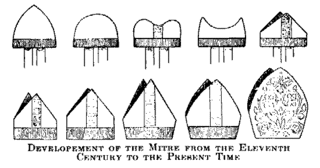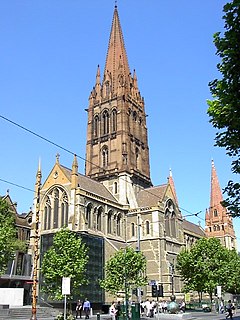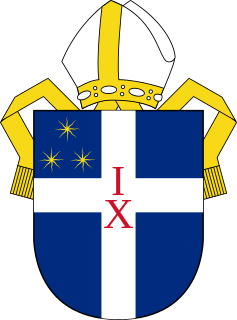
The Anglican Communion is the third largest Christian communion. Founded in 1867 in London, England, the communion currently has 85 million members within the Church of England and other national and regional churches in full communion. The traditional origins of Anglican doctrines are summarised in the Thirty-nine Articles (1571). The Archbishop of Canterbury in England acts as a focus of unity, recognised as primus inter pares, but does not exercise authority in Anglican provinces outside of the Church of England.

Anglicanism is a Western Christian tradition that evolved out of the practices, liturgy and identity of the Church of England following the Protestant Reformation.

An episcopal polity is a hierarchical form of church governance in which the chief local authorities are called bishops. It is the structure used by many of the major Christian Churches and denominations, such as the Roman Catholic, Eastern Orthodox, Oriental Orthodox, Church of the East, Anglican, and Lutheran churches or denominations, and other churches founded independently from these lineages.

In the Christian churches, holy orders are ordained ministries such as bishop, priest, or deacon, and the sacrament or rite by which candidates are ordained to those orders. Churches recognizing these orders include the Catholic Church, the Eastern Orthodox, Oriental Orthodox, Anglican, Assyrian, Old Catholic, Independent Catholic and some Lutheran churches. Except for Lutherans and some Anglicans, these churches regard ordination as a sacrament. The Anglo-Catholic tradition within Anglicanism identifies more with the Roman Catholic position about the sacramental nature of ordination.

Anglo-Catholicism, Anglican Catholicism, or Catholic Anglicanism comprises people, beliefs and practices within Anglicanism that emphasise the Catholic heritage and identity of the various Anglican churches.

Ash Wednesday is a Christian holy day of prayer, fasting, even if it is not a holy day of obligation It is preceded by Shrove Tuesday and falls on the first day of Lent, the six weeks of penitence before Easter. Ash Wednesday is traditionally observed by Western Christians, including Anglicans, Episcopalians, Lutherans, Old Catholics, Methodists, Presbyterians, some Baptists, and most Latin Rite Roman Catholics.
The Continuing Anglican movement, also known as the Anglican Continuum, encompasses a number of Christian churches that are from the Anglican tradition but that are not part of the Anglican Communion. The largest of these are the Anglican Catholic Church, the Anglican Church in America, the Anglican Province of America, the Anglican Province of Christ the King, the Diocese of the Holy Cross, the Episcopal Missionary Church, and the United Episcopal Church of North America. These churches generally believe that traditional forms of Anglican faith and worship have been unacceptably revised or abandoned within some Anglican Communion churches in recent decades. They claim, therefore, that they are "continuing" or preserving the Anglican line of apostolic succession as well as historic Anglican belief and practice.

The Anglican Church of Australia is a Christian church in Australia and an autonomous province of the Anglican Communion. It is the second largest church in Australia, after the Roman Catholic Church. According to the 2016 census, 3.1 million Australians identify as Anglicans. For much of Australian history, the Church of England was the largest religious denomination. It remains today one of the largest providers of social welfare services in Australia.

The term "high church" refers to beliefs and practices of ecclesiology, liturgy, and theology, generally with an emphasis on formality and resistance to "modernisation". Although used in connection with various Christian traditions, the term originated in and has been principally associated with the Anglican/Episcopal tradition, where it describes Anglican churches using a number of ritual practices associated in the popular mind with Roman Catholicism. The opposite is low church. Contemporary media discussing Anglican churches tend to prefer evangelical to "low church", and Anglo-Catholic to "high church", though the terms do not exactly correspond. Other contemporary denominations that contain high church wings include some Lutheran, Presbyterian, and Methodist churches.

The Anglican Use is an officially approved form of liturgy used by former members of the Anglican Communion who joined the Catholic Church while wishing to maintain the treasures of the Anglican tradition.

The term "low church" refers to churches which give relatively little emphasis to ritual, sacraments and the authority of clergy. The term is most often used in a liturgical context.

The Anglican Church of Canada is the province of the Anglican Communion in Canada. The official French-language name is l'Église anglicane du Canada. In 2007, the Anglican Church counted 545,957 members on parish rolls in 2792 congregations, organised into 1676 parishes. The 2011 Canadian Census counted 1,631,845 self-identified Anglicans, making the Anglican Church the third-largest Canadian church after the Roman Catholic Church and the United Church of Canada. The Queen of Canada's Canadian Royal Style continues to include the title of Defender of the Faith, and the Canadian Monarch continues her countenance of three Chapels Royal in the Realm.

The Anglican Church of Southern Africa, known until 2006 as the Church of the Province of Southern Africa, is the province of the Anglican Communion in the southern part of Africa. The church has twenty-eight dioceses, of which twenty-one are located in South Africa, two in Mozambique, and one each in Angola, Lesotho, Namibia, Swaziland and Saint Helena. In South Africa, there are between 3 and 4 million Anglicans out of an estimated population of 45 million.

Churchmanship is a way of talking about and labelling different tendencies, parties, or schools of thought within the Church of England and the sister churches of the Anglican Communion.

The Anglican Diocese of Perth is one of the 23 dioceses of the Anglican Church of Australia. The constitution of the Diocese of Perth was passed and adopted in 1872 at the first synod held in Western Australia. In 1914, the Province of Western Australia was created and the diocesan bishop of Perth became ex officio metropolitan bishop of the new province and therefore also an archbishop. The diocese incorporates the southern part of the state of Western Australia and includes the Christmas and Cocos Islands. The other dioceses in the Anglican Province of Western Australia are the Diocese of Bunbury and the Diocese of North West Australia.

The Anglican Diocese of Melbourne is the metropolitan diocese of the Province of Victoria in the Anglican Church of Australia. The diocese was founded from the Diocese of Australia by letters patent of 25 June 1847 and includes the cities of Melbourne and Geelong and also some more rural areas. The cathedral church is St Paul's Cathedral, Melbourne. The ordinary of the diocese is the Archbishop of Melbourne, Philip Freier, who was translated from the Anglican Diocese of The Northern Territory.

The Anglican Church in North America (ACNA) is a Christian denomination in the Anglican tradition in the United States and Canada. It also includes ten congregations in Mexico and a missionary diocese in Cuba. Headquartered in Ambridge, Pennsylvania, the church reported 30 dioceses and 1,037 congregations serving an estimated membership of 134,593 in 2017. The first archbishop of the ACNA was Robert Duncan, who was succeeded by Foley Beach in 2014.

The Episcopal Church (TEC) is a member church of the worldwide Anglican Communion based in the United States with dioceses elsewhere. It is a mainline Christian denomination divided into nine provinces. The presiding bishop of the Episcopal Church is Michael Bruce Curry, the first African-American bishop to serve in that position.
A personal ordinariate, sometimes called a "personal ordinariate for former Anglicans" or more informally an "Anglican ordinariate", is a canonical structure within the Catholic Church established in accordance with the apostolic constitution Anglicanorum coetibus of 4 November 2009 and its complementary norms. The ordinariates were established in order to enable "groups of Anglicans" to join the Catholic Church while preserving elements of their liturgical and spiritual patrimony. They are juridically equivalent to a diocese, "a particular church in which and from which exists the one and unique Catholic Church", but may be erected in the same territory as other dioceses "by reason of the rite of the faithful or some similar reason".













